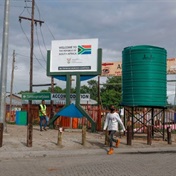
Since 2007, the deaf community has been waiting for the day that they are recognised.
For about 16 years, engagements on officialising their language as part of South Africa’s official languages have been heard and presented.
These engagements proved to not have been futile on 2 May this year when the amendment of section 6 of the constitution was approved by parliament.
This section now contains sign language as the 12th official language of the country.
Rendering his speech at a ceremony in the Union Buildings where the amended bill was signed into law on 19 July, President Cyril Ramaphosa acknowledged that the road to this day has been long.
“Having sign language recognised as an official language will address access to education, economic and other social opportunities as well as public participation. People with hearing impairments will be able to also access more services, public information and a host of other opportunities.”
He added that officialising the language is only the beginning as there is still a lot of work to do.
“It has to be standardised to collapse various geographical dialects into one standard official version which is the remit of the Pan South African Language Board (PanSALB). The fact that the first comprehensive electronic sign language dictionary has already been developed demonstrates the enthusiasm to develop this language.”
Read More | My son is partly deaf because of R20 - Mother of a 20-year-old who was burned with acid
Noting that PanSALB has been hard at work, improving and developing the language for this day, the president also said that the recommendations from the board’s report on the lexical and grammatical standardisation of the language are currently being enacted.
Speaking to Drum about this victory, a member of PanSALB and the deaf community Cinga Gqabu says it has been a long time coming.
“It’s incredible! WOW! I am happy and over the moon! Many members of the Deaf community found the long wait to be discouraging at times. However, the drive to see the rights of persons with disabilities fully recognised gave many the strength to persevere until this historic moment.”
Born deaf, Cinga realised in his childhood that he was different from others.
“When I played outside with other children, most of them would even be afraid to approach me because of the communication gap.”
Because of this, he dedicated his work to realising the inclusion of the deaf community. Now that sign language is official, he has one more wish.
“I wish that people would be more aware of deaf culture and take the time to learn South African Sign Language (SASL). All South Africans must accept, recognise and respect the deaf person’s inherent right to use SASL and create a society where SASL is advanced, promoted, maintained and regularly used in all aspects of Deaf persons’ life in South Africa.
“SASL is the primary language of Deaf persons in South Africa and should be respected as a language of choice to be used in all interactions. It is an indigenous language that constitutes an important element of South African linguistic and cultural heritage. Many deaf people missed a lot of important issues during the Covid 19 pandemic due to the scarcity of information in SASL. We are hopeful that things will improve now that SASL is an official language in the country,” says the Mdantsane-born member.
Elaborating on the importance of having SASL officialized, PanSALB CEO Lance Schultz reiterates that the exclusion of deaf people has been harshly felt by the community over the years.
“The key aspect for us, which is of paramount importance, is ensuring that government and society at large, views this as a call to action and take the necessary steps to improve the Deaf community’s access to quality information and services through employing various interventions, including the training of frontline workers providing in basic SASL to equip them to engage with the Deaf community.”
Read More | My child can hear birds now: a mother on raising a child with a hearing disability
As an institution, he adds that they are pleased to witness this historic moment in democracy.
“We believe that this achievement further validates and solidifies South African Sign Language as a language resource for unleashing the potential of the deaf community at large.”
On 4 September 2020, “the board published the South African Sign Language Charter which contains nine key pledges that serve as a framework to promote the fair and courteous treatment of the deaf that must be adopted by all spheres of government and civil society. Therefore, as an institution, we will continue conducting advocacy and awareness campaigns for its adoption to drive the implementation of South African Sign Language as an official language in the country,” he tells Drum.
The institution has more projects in the pipeline that include digitalising SASL and the further standardisation of the language for purposes of education and other public domains.
The language will also undergo an advancement for 4IR technological development using place names and the establishment of a National Lexicography Unit (NLU) which will be responsible for the compilation of dictionaries for South African Sign Language.



















